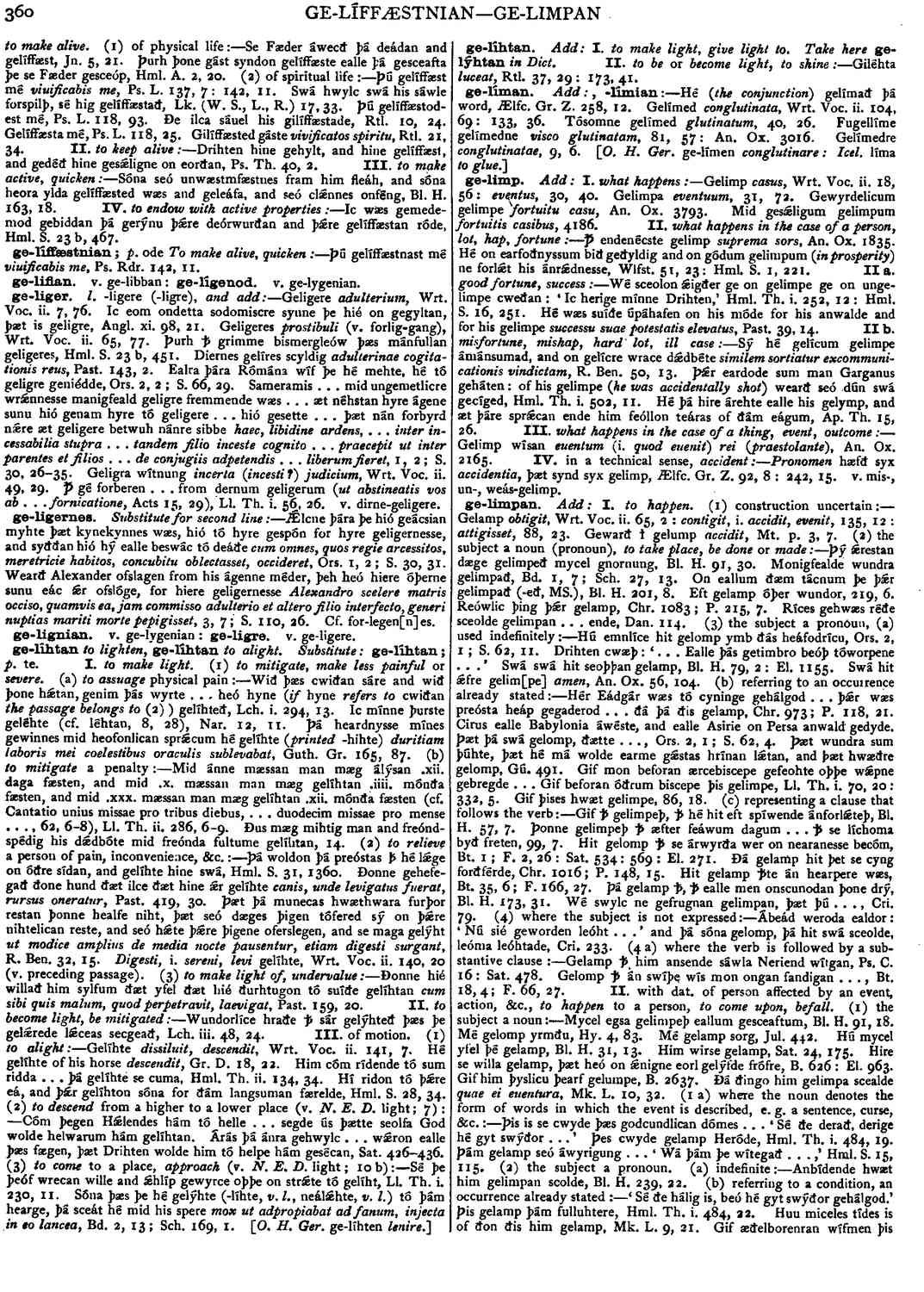ge-líhtan
- verb [ weak ]
- Wið þæs cwiðan sáre and wið þone hǽtan, genim þás wyrte . . . heó hyne (if hyne refers to cwiðan the passage belongs to
- Guth. Gr. 165, 87.
-
Mid ánne mæssan man mæg álýsan .xii. daga fsesten, and mid .x. mæssan man mæg gelíhtan .iiii. mónða fæsten, and mid .xxx. mæssan man mæg gelíhtan .xii. mónða fæsten (cf, Cantatio unius missae pro tribus diebus, . . . duodecim missae pro mense . . . ,
- 62, 6-8), Ll. Th. ii. 286, 6-9.
- Ðus mæg mihtig man and freóndspédig his dǽdbóte mid freónda fultume gelíhtan, 14.
- Þá woldon þá preóstas ꝥ hé lǽge on óðre sídan, and gelíhte hine swá. Hml. S. 31, 1360.
-
Ðonne gehefegað ðone hund ðæt ilce ðæt hine ǽr gelíhte
canis, unde levigatus fuerat, rursus oneratur,
- Past. 419, 30.
-
Þæt þá munecas hwæthwara furþor restan þonne healfe niht, þæt seó dæges þigen tófered sý on þǽre nihtelican reste, and seó hǽte þsére þigene oferslegen, and se maga gelýht
ut modice amplius de media nocte pausentur, etiam digesti surgant, R. Ben. 32, 15. Digesti, i. sereni, levi
gelíhte,- Wrt. Voc. ii. 140, 20 (v. preceding passage).
-
Ðonne hié willað him sylfum ðæt yfel ðæt hié ðurhtugon tó suíðe gelíhtan
cum sibi quis malum, quod perpetravit, laevigat,
- Past. 159, 20.
-
Wundorlíce hraðe ꝥ sár gelýhteð þæs þe gelǽrede lǽceas secgeað,
- Lch. iii. 48, 24.
-
Gelíhte
dissiluit, descendit,
- Wrt. Voc. ii. 141, 7.
-
Hé gelíhte of his horse
descendit,
- Gr. D. 18, 22.
-
Him cóm rídende tó sum ridda . . . þá gelíhte se cuma,
- Hml. Th. ii. 134, 34.
-
Hí ridon tó þǽre eá, and þǽr gelíhton sóna for ðám langsuman færelde,
- Hml. S. 28,
-
Cóm þegen Hílendes hám tó helle . . . segde ús þætte seolfa God wolde helwarum hám gelíhtan. Árás þá ánra gehwylc . . . wǽron ealle þæs fægen, þæt Drihten wolde him tó helpe hám gesécan,
- Sat. 426-436.
-
Sé þe þeóf wrecan wille and ǽhlíp gewyrce oþþe on strǽte tó gelíht, Ll. Th. i. 230, II. Sóna þæs þe hé gelýhte (-líhte, v.l., neálíéhte, v.l.) tó þám hearge, þá sceát hé mid his spere
mox ut adpropiabat adfanum, injecta in eo lancea,
- Bd. 2, 13; Sch. 169, I.
Bosworth, Joseph. “ge-líhtan.” In An Anglo-Saxon Dictionary Online, edited by Thomas Northcote Toller, Christ Sean, and Ondřej Tichy. Prague: Faculty of Arts, Charles University, 2014. https://bosworthtoller.com/48687.
Checked: 0